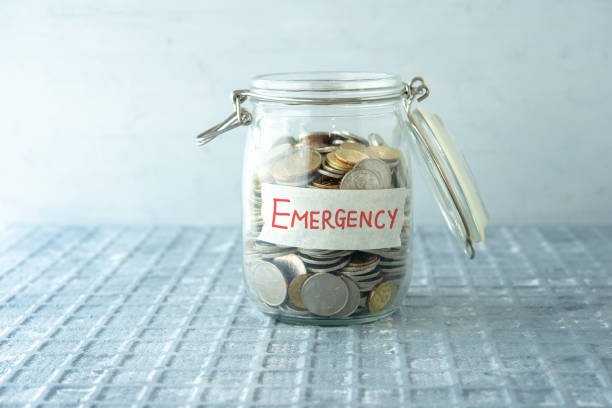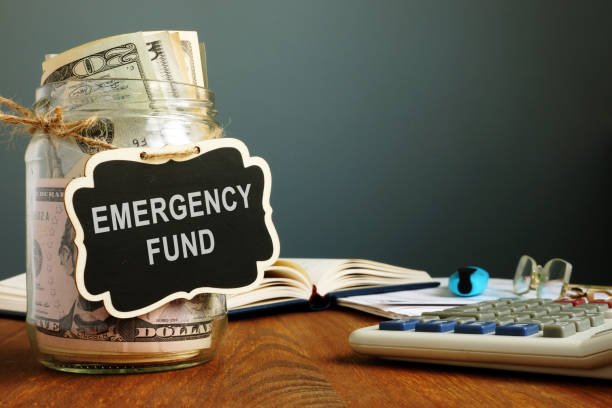Introduction
In today’s world, the key to financial stability and security is a strong Emergency Funds. This fund protects you from unexpected expenses and financial emergencies that can arise at any time, such as medical emergencies, job loss, or urgent repairs.
In this article, we will understand the importance of emergency funds and learn how you can build this fund. An emergency fund is a financial cushion that provides you with financial stability and peace of mind.
What is an Emergency Funds?

An emergency fund is an account where you reserve money to cover unexpected financial needs. This fund helps you avoid financial stress in case of sudden medical expenses, car repairs, or job loss. Typically, the amount of this fund is equal to 3 to 6 months of your monthly expenses. This fund helps you handle emergency situations without needing debt or loans.
Importance of an Emergency Fund
Understanding the importance of an emergency fund is crucial because it provides financial security and stability. When you have an emergency fund, you can handle any financial crisis calmly without panic or stress. This fund helps you address short-term financial needs, making it easier to maintain your daily routines.
How Much Emergency Fund Should You Have?
The amount of emergency fund you should have depends on your personal expenses and lifestyle. A general rule of thumb suggests that your emergency fund should be equal to 3 to 6 months of your monthly expenses. If your job stability is low or you have special medical needs in your family, you should reserve a larger amount. This way, you will be prepared for any unexpected situation.
How to Plan Your Emergency Fund?
When planning your emergency fund, first calculate your monthly expenses. This includes rent, utilities, groceries, and other essential expenses. Once you know your monthly expenses, you can decide how much to reserve. After planning, you can gradually increase your savings to reach your target amount.
How to Build Your Emergency Fund?

To build an emergency fund, first assess your budget. Review your monthly expenses and savings to see how much you can save. Deposit your savings into your emergency fund each month and align them with your financial goals. This process may take time, but with patience and consistency, you can reach your target amount.
Where to Keep Your Emergency Fund?
Your emergency fund should be kept in a safe and easily accessible account. You can invest in savings accounts, money market accounts, or short-term certificates of deposit (CDs). These accounts provide easy access and reasonable interest rates. It’s important to keep your emergency fund in an account that offers liquidity, so you can withdraw money easily when needed.
Common Mistakes to Avoid
When building an emergency fund, it is important to avoid common mistakes. First, do not use your emergency fund for daily expenses. This fund should be reserved only for emergencies. Second, be patient in building your fund and regularly review your savings goals. Lastly, do not invest your emergency fund in volatile short-term investments.
How to Increase Your Emergency Fund?
If your goal is to quickly increase your emergency fund, you need to boost your savings rate. You can revise your monthly budget and cut down on unnecessary expenses. Explore additional income sources, such as part-time jobs or freelancing. Regularly review your savings to ensure you achieve your target amount in a timely manner.
How to Maintain Your Emergency Fund?

To maintain your emergency fund, regular monitoring is necessary. Review your budget and savings each month to ensure your fund is sufficient. If you use your emergency fund, replenish it quickly to be prepared for future emergencies. With regular contributions and disciplined savings, you can effectively maintain your emergency fund.
Benefits of Having an Emergency Fund
The benefits of an emergency fund are numerous. It provides you with financial peace of mind and stability, helping you feel stress-free and secure. With this fund, you can calmly handle emergency situations and minimize financial stress. This fund also supports your long-term financial goals, keeping you debt-free and financially secure.
Conclusion
An Emergency Funds is a financial safety net that protects you from unexpected situations. Building and maintaining this fund is essential for your financial stability and peace of mind. With planning, consistency, and smart management, you can effectively build and maintain your emergency fund. This fund will help you navigate any financial crisis and keep you feeling secure and confident.





